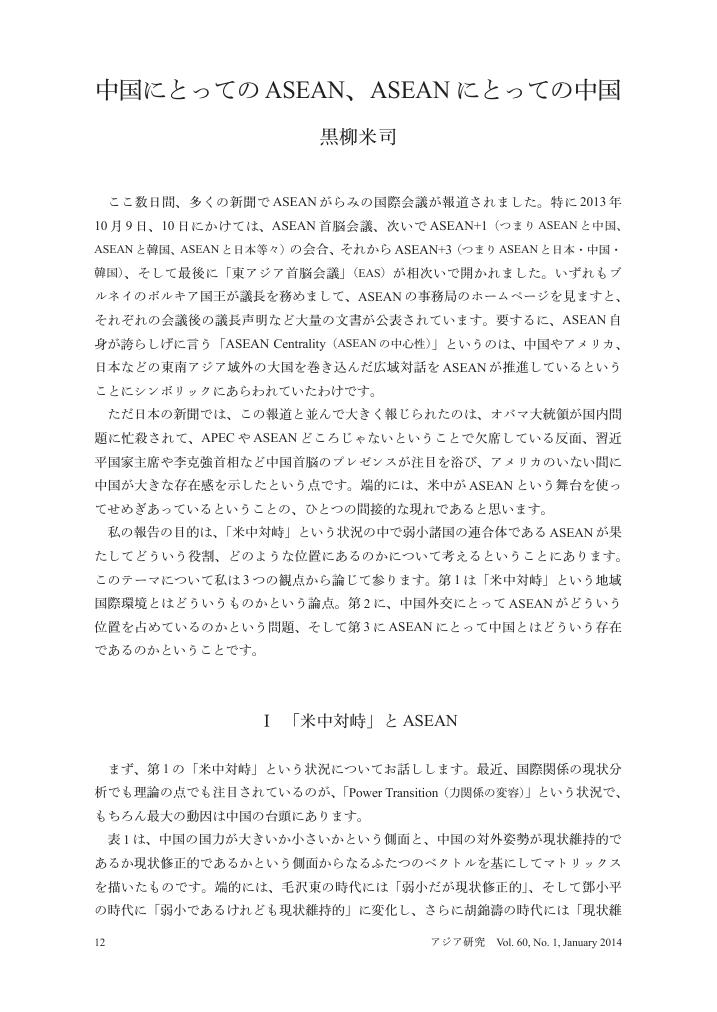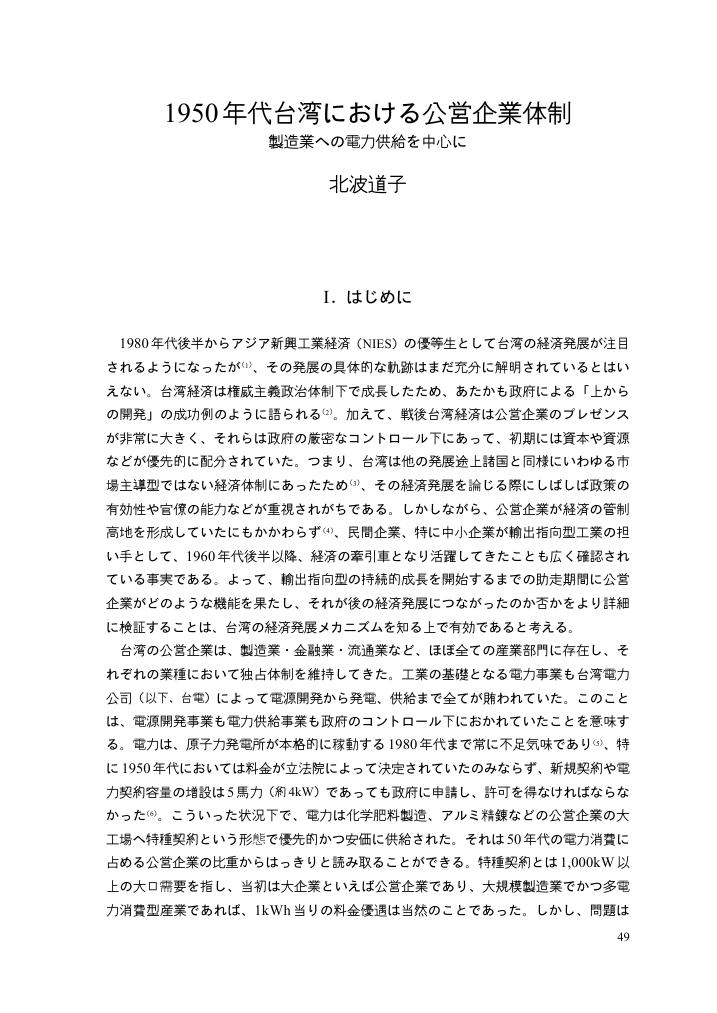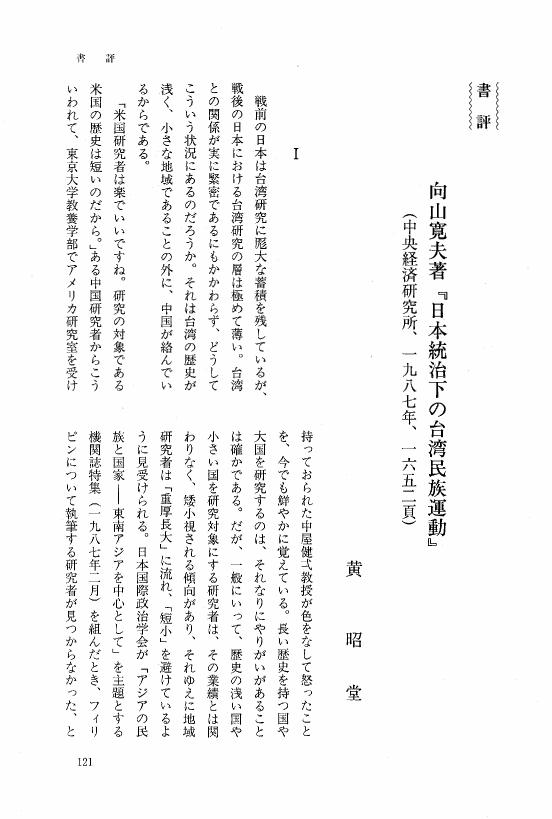1 0 0 0 OA 「一国二制度」下の中国―香港関係
- 著者
- 倉田 徹
- 出版者
- 一般財団法人 アジア政経学会
- 雑誌
- アジア研究 (ISSN:00449237)
- 巻号頁・発行日
- vol.49, no.4, pp.26-43, 2003 (Released:2014-09-15)
- 著者
- 大澤 武司
- 出版者
- 一般財団法人 アジア政経学会
- 雑誌
- アジア研究 (ISSN:00449237)
- 巻号頁・発行日
- vol.49, no.3, pp.54-70, 2003
- 著者
- 永野 護
- 出版者
- 一般財団法人 アジア政経学会
- 雑誌
- アジア研究 (ISSN:00449237)
- 巻号頁・発行日
- vol.51, no.4, pp.50-64, 2005
Reflecting on recent efforts to promote bond market development in East Asia, this paper focuses on the determinants of corporate credit rating behavior of US and regional credit rating agencies. The following implications are derived from an empirical analysis using corporate data from 1998 to 2002. First, the corporate interest coverage ratio is significantly related to the corporate rating behavior of US rating agencies, but is insignificant with respect to the rating decisions of local agencies. On the other hand, firm size significantly influences the rating decisions of regional agencies while it is insignificant with respect to US agencies. Furthermore, each of the four local credit agencies has an individual factor that determines corporate bond credit rating. This paper infers that this difference in determinants originates from various factors such as long-term experience in the rating business, ownership structures and historical business backgrounds.
1 0 0 0 OA 李 元徳著『韓国外交と外交官―呉在煕元駐日大使』
- 著者
- 小針 進
- 出版者
- 一般財団法人 アジア政経学会
- 雑誌
- アジア研究 (ISSN:00449237)
- 巻号頁・発行日
- vol.61, no.1, pp.81-85, 2015-05-24 (Released:2015-06-04)
- 参考文献数
- 2
1 0 0 0 OA 海賊版書籍からみた近現代中国の出版政策とメディア界
- 著者
- 中村 元哉
- 出版者
- 一般財団法人 アジア政経学会
- 雑誌
- アジア研究 (ISSN:00449237)
- 巻号頁・発行日
- vol.52, no.4, pp.1-19, 2006-10-31 (Released:2014-09-30)
- 参考文献数
- 107
The goal of this paper is to examine how the history of laws governing the press and awareness of the concept of copyright have influenced and controlled modern and contemporary Chinese media. This paper looks at the degree to which press policies were enacted and systematized in China from the late Qing period on, and analyzes the level of awareness of publishing rights in society in general. These issues are discussed by focusing on pirated editions, thereby allowing us to investigate two major topics critical for understanding modern and contemporary China’s press policy and publishing industry: censorship and culture, and the promotion of industry.This paper makes clear the following two points: first, in modern and contemporary China, copyright and censorship have been closely linked. This relationship is not apparent in Europe, the United States and Japan, whose legal systems posit a distinction between laws governing the public realm and laws governing the private realm. Secondly, in China copyright was not only held by authors, it was also held by publishers, and in reality the latter had a more dominant position. This was a characteristic of the late Qing and Republican eras and has shaped the legal system and rights-consciousness in contemporary China (see case 7 in the main text). Having a historical perspective is crucial to analyzing the current situation.
1 0 0 0 OA 中国にとってのASEAN、ASEANにとっての中国
- 著者
- 黒柳 米司
- 出版者
- 一般財団法人 アジア政経学会
- 雑誌
- アジア研究 (ISSN:00449237)
- 巻号頁・発行日
- vol.60, no.1, pp.12-17, 2014-10-15 (Released:2014-10-25)
- 参考文献数
- 2
1 0 0 0 OA マルコス体制崩壊過程における市民社会の実相
- 著者
- 五十嵐 誠一
- 出版者
- 一般財団法人 アジア政経学会
- 雑誌
- アジア研究 (ISSN:00449237)
- 巻号頁・発行日
- vol.53, no.1, pp.37-57, 2007-01-31 (Released:2014-09-30)
- 参考文献数
- 66
The main purpose of this paper is to explore the dynamics of the hegemonic struggles over democratization in civil society that took place during the dismantling process of the Marcos regime in the Philippines and to analyze the manner in which these struggles influenced the direction of democratization.The collapse of the Marcos dictatorship was a fascinating phenomenon that has aroused the curiosity of researchers. One of the reasons for this is the emergence of an overwhelming civic uprising, often known as “people power,” which finally overthrew the Marcos regime in February1986. Many analysts and researchers have tried to explain this uprising as the crystallization of civil society.However, a brief review of previous studies reveals that most of these have treated civil society as a homogeneous sphere or have focused only on the activities of a particular actor as a representative of the entire civil society. Little attention has been paid to the complicated dynamics of collaborations and collisions among various actors in civil society as well as their effects on the direction and content of democratization.Civil society is not a monolithic entity. It is the main arena in which different classes and groups struggle to assume their own hegemony. During the process of democratization, suchstruggles can be transformed into explicit contests over the nature and scope of democracy. Civil society in the Philippines was a typical case. Although it is often said that the process of democratization in the Philippines reflected the interests of the conservative and dominant class, an extensive examination of the hegemonic struggles in civil society reveal a different picture of this democratic transition.Section I discusses the analytical framework of this paper. Section II outlines schematically the different forces within civil society shortly after the assassination of Benigno Aquino in August1983, mainly based on ideology and class. Section III presents an empirical and descriptive analysis of the political process with particular focus on the hegemonic struggles in civil society until the collapse of the Marcos regime in February 1986.This paper shows that the hegemonic struggles in civil society had a significant influence on the direction of democratization and that democratization was steered in an ambivalent direction beyond the interests of the dominant class primarily due to the counter-hegemony created by radical movements in civil society.
1 0 0 0 OA 1950年代台湾における公営企業体制
- 著者
- 北波 道子
- 出版者
- 一般財団法人 アジア政経学会
- 雑誌
- アジア研究 (ISSN:00449237)
- 巻号頁・発行日
- vol.48, no.2, pp.49-71, 2002 (Released:2014-09-15)
1 0 0 0 OA Robert Taylor 『The State in Myanmar』
- 著者
- 熊田 徹
- 出版者
- 一般財団法人 アジア政経学会
- 雑誌
- アジア研究 (ISSN:00449237)
- 巻号頁・発行日
- vol.57, no.2, pp.82-86, 2011-04-30 (Released:2014-09-15)
1 0 0 0 OA カンボジアにおける企業の銀行借入比率の決定要因―ドル化経済における借入通貨制約
- 著者
- 奥田 英信 相場 大樹
- 出版者
- 一般財団法人 アジア政経学会
- 雑誌
- アジア研究 (ISSN:00449237)
- 巻号頁・発行日
- vol.64, no.2, pp.1-20, 2018-04-30 (Released:2018-05-15)
- 参考文献数
- 38
Cambodia is one of the most highly “dollarized” economies in the world. However, due to the lack of micro-level data, econometric studies of individual economic entities such as households and companies are limited, and corporate financing has not been investigated using econometric techniques. This paper is a pioneering econometric analysis to elucidate the characteristics and determinants of Cambodian companies’ bank borrowing in dollars. In addition, this paper is unique in analyzing the specific Cambodian feature that, unlike the ordinal dollarization case in which companies can select the currency in which to borrow, Cambodian companies have no other choice but to borrow in dollars. This paper uses a sample selection model to estimate the determinants of the dollar bank borrowing ratio for 103 companies by using the data set collected by the NBC-JICA joint survey in 2014. According to the estimation results, (1) Companies’ ability to provide collateral and insurance coverage has the positive effect on raising the dollar bank borrowing ratio, while (2) abundant internal funds lower the dollar bank borrowing ratio. (3) The impact of the dollar-denominated revenue ratio on dollar borrowing depends on the abundance of corporate internal funds, (4) for companies with poor financial margins it has no impact, while for companies with affordability, it has a positive impact on the dollar-denominated bank borrowing ratio. These results support the standard corporate financing hypothesis in Cambodia, where the financial development has been delayed. However, firms are facing borrowing constraints and the amount of collateral is useful for expanding dollar-denominated bank borrowing. Also, although there is a currency mismatch risk that is specific to the dollarized economy, companies lacking affordable internal funds tend to use dollar-denominated borrowing without paying attention to the accompanying currency risk. The estimated results suggest several policy tasks. First, in order to improve the asymmetry of information, efforts by financial institutions such as to improve the bank screening ability, and corporate efforts such as to improve the accounting and organization of financial information are required. Second, in order to expand the use of collateral and insurance, which is already playing an important role in corporate financing, it is important to develop the land registration system and disseminate the insurance system. Third, it is necessary to pay more attention to currency mismatches in the dollarized economy.
1 0 0 0 ウズベキスタンの慣習経済--マハッラの共同体的機能の検討から
- 著者
- 樋渡 雅人
- 出版者
- アジア政経学会
- 雑誌
- アジア研究 (ISSN:00449237)
- 巻号頁・発行日
- vol.50, no.4, pp.79-97, 2004-10
1 0 0 0 経済成長と宗教ナショナリズム―2014年総選挙から見たインド社会
- 著者
- 中溝 和弥
- 出版者
- Japan Association for Asian Studies
- 雑誌
- アジア研究 (ISSN:00449237)
- 巻号頁・発行日
- vol.61, no.4, pp.3-21, 2015
Can we interpret the result of the 2014 general elections in India as the re-emergence of Hindu nationalism? If we can, does this mean that the majority support exclusive nationalism that is propagated by Hindu nationalists? In this article, in order to answer these questions, I analyze elector's voting behavior at national, state, and village levels. <BR>At the national level, the election issues were the mal-governance of the incumbent UPA government as exemplified by stagflation and corruption, and the exalted hope in the capacity of Narendra Modi's decisive leadership to solve these economic difficulties. In this election, the lower strata of society, that is, the Lower Backward Castes and Scheduled Castes, who were not traditional supporters of the BJP, voted for Narendra Modi's BJP. In this sense, the BJP succeeded in consolidating the long-awaited "Hindu vote" in a loose way. This does not necessarily mean that the "Hindu vote" supports the exclusive Hindu nationalism that was expressed during the 2002 Gujarat carnage. However, they did implicitly endorse the political decision that Modi took at that time. <BR>In Bihar, which the BJP has been eager to capture for a long time but had failed to do so, the BJP and its alliance won the election. On analysis, the voting behavior in the state shows the same trend as at the national level. Considering the good reputation of the incumbent JD(U) state government, this result may reflect strategic voting behavior in which many voters took account of the national elections. However, we can observe that the "Hindu vote" is loosely taking shape in Bihar, also. <BR>Lastly, at the village level, the BJP could not win in the constituency where I conducted my fieldwork. However, the BJP candidate did succeed in getting a considerable number of votes. In a Yadav dominated village, most Yadavs supported the RJD, which is known as the Yadav's party, and the Scheduled Castes supported the JD(U) government. However, among stubborn supporters of the RJD, there were some who held out strong hopes for Modi. Their main concerns are economic issues, not the exclusion of minorities. <BR>In conclusion, BJP's victory represents the aspiration of voters for economic betterment. On the other hand, the political responsibility for the 2002 Gujarat carnage has become a thing of the past. The present Modi BJP government does not seem interested in instigating religious violence to consolidate their power. However, if they fail to meet voters' aspirations, the danger of a violent exclusion of the minority is ever-present as Hindu nationalists have vigorously conducted an anti-Muslim campaign since Modi seized power.
1 0 0 0 OA 向山寛夫著『日本統治下の台湾民族運動』
- 著者
- 黄 昭堂
- 出版者
- 一般財団法人 アジア政経学会
- 雑誌
- アジア研究 (ISSN:00449237)
- 巻号頁・発行日
- vol.35, no.1, pp.121-129, 1988 (Released:2014-09-15)
1 0 0 0 OA 戦前期の世界生糸市場を巡るアジア間戦争
- 著者
- 金子 晋右
- 出版者
- 一般財団法人 アジア政経学会
- 雑誌
- アジア研究 (ISSN:00449237)
- 巻号頁・発行日
- vol.48, no.2, pp.30-48, 2002 (Released:2014-09-15)
- 参考文献数
- 74
- 著者
- 土田 哲夫
- 出版者
- 一般財団法人 アジア政経学会
- 雑誌
- アジア研究 (ISSN:00449237)
- 巻号頁・発行日
- vol.35, no.4, pp.97-110, 1989 (Released:2014-09-15)
- 著者
- 小西 鉄
- 出版者
- 一般財団法人 アジア政経学会
- 雑誌
- アジア研究 (ISSN:00449237)
- 巻号頁・発行日
- vol.62, no.2, pp.1-17, 2016-04-30 (Released:2016-05-17)
- 参考文献数
- 56
- 被引用文献数
- 1
According to the empirical study by Leuz and Oberholzer-Gee 2006, there is a trade-off between political connections and foreign financing for well-connected firms. Such a dualistic trade-off, however, does not take into consideration the dynamics of a company’s internal structure. This paper takes the case of the Bakrie Group, one of Indonesia’s most powerful business groups, to investigate how such dynamics also influence a firm’s behavior.Since its foundation in 1942, the Bakrie Group has grown as a prominent indigenous, or Pribumi, business group, developing businesses in wide range of sectors such as steel and mineral resources under Suharto’s authoritarian regime. After the Group reorganized enormous debts caused by the Asian Economic Crisis in 1997–98, the founder’s eldest son, Aburizal Bakrie, emerged on the Indonesian political stage, and with his political support the Bakrie Group experienced rapid growth. The Bakrie family has continued to dominate the Group’s management, making sure that the “independent” commissioners mandated by corporate governance reform in 1999 were in fact Bakrie supporters. After the Global Financial Crisis of 2008, the politically connected group co-founded an international coal mining investment company, Bumi Plc., with Nathaniel Rothschild, a British financial tycoon, and listed it on the London Stock Exchange (LSE), which requires a high standard of corporate governance. This effort was led by a team of professional management personnel within the company in an attempt to improve the Group’s governance. But, after listing on the LSE, the Bakrie family, using financial means, exploited minority shareholders within Bumi Plc. and withdrew from the new LSE-listed company using their business connections. Those shareholders—businesses that shared common interests with the Bakries—clearly impeded accurate corporate governance procedures. The case therefore illustrates that political connections and international finance are not always in a trade-off but, depending on the dynamics within a business group, can be compatible. After observing the conflict within the Bakrie Group, a technocratic minister in the government suggested revising Indonesia’s corporate governance standards, admitting there had been a “government failure” and urging more pressure for reform. Introducing more strict regulations to screen each independent commissioner is therefore needed.
1 0 0 0 OA 日本における現代インド政治の研究
- 著者
- 中村 平治
- 出版者
- 一般財団法人 アジア政経学会
- 雑誌
- アジア研究 (ISSN:00449237)
- 巻号頁・発行日
- vol.11, no.1, pp.81-95, 1964 (Released:2014-09-15)
1 0 0 0 OA 木村宏恒著『インドネシア現代政治の構造』
- 著者
- 萩原 宜之
- 出版者
- 一般財団法人 アジア政経学会
- 雑誌
- アジア研究 (ISSN:00449237)
- 巻号頁・発行日
- vol.37, no.1, pp.109-118, 1990 (Released:2014-09-15)
1 0 0 0 北タイの守護霊観念と農民家族:ピー・プーヤー礼儀の事例研究
- 著者
- 高井 康弘
- 出版者
- Japan Association for Asian Studies
- 雑誌
- アジア研究 (ISSN:00449237)
- 巻号頁・発行日
- vol.37, no.2, pp.33-70, 1991









